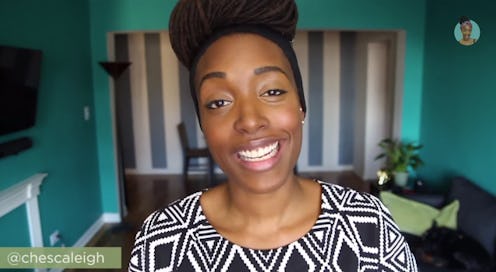Life
Five Tips On How to Be a Good Ally

Needless to say, there’s been a lot of outrage in the black community over the last few weeks. From the police officers in both the Mike Brown and Eric Garner cases dodging indictment to the recent death of 12-year-old Tamir Rice, protestors are speaking up about racism and police brutality. If you’re not black and would like to show your support of the black community, popular Youtuber Franceshca Ramsey, AKA Chescaleigh, has five helpful tips on how to be an ally. A couple of years ago she gave us “Shit White Girls Say to Black Girls," and has since used her Youtube channel as a platform for addressing social issues. Her tips are helpful for supporting any marginalized community, not just those based on race.
1. Understand your privilege.
As Ramsey points out, some people don’t seem to understand what "privilege" is. The common misunderstanding I come across is that it means somebody has been given extra advantages in life... that's not exactly what it means. According to Ramsey “all it means is that there are some things in life that you will not experience or ever have to think about, just because of who you are.” In order to help address the problems in a system, you need to understand how you benefit from it.
2. Listen and do your homework.
You can't help a community if you don't even know what the community needs help with. So listen up when somebody is speaking about their experiences and don't dismiss them just because they don't reflect your understanding. And then from there, do your own follow up research. It’s not the responsibility of somebody from a marginalized group to sit you down and break down their oppression for you, and to demand that places your needs above theirs. Google is your oyster, use it.
3. Speak up, not over.
Being an ally means “using your privilege and your voice to educate others, but make sure to do it in such a way that does not speak over community members that you’re trying to support.” Like Ramsey says in her video, you’re the Michelle of the group; this isn’t about you. If you’re talking over people of the community trying to express their concerns, how exactly are you supporting them?
4. You’ll make mistakes! Apologize when you do.
Becoming a more socially just person is a never-ending process. There’s a lot to unlearn and a lot to learn, so you’re not going to get things right automatically. But when you do get called out and corrected, don't get defensive, but learn from the opportunity. And apologize. If you need help with that, Franchesca also has a helpful video on how to apologize!
5. Ally is a verb.
Being an ally requires action. It’s not enough to say you’re an ally and then not speak up when friends and family make racist, sexist, or homophobic or other insensitive remarks. Does defending marginalized groups make you uncomfortable? Then just imagine how uncomfortable things must be for the people on the receiving end of that hate. “Saying you’re an ally is not enough. You gotta do the work.”
Have more questions? Need more tips? Click through to watch the video on YouTube and check out the description box for all the helpful links that Ramsey has graciously provided.